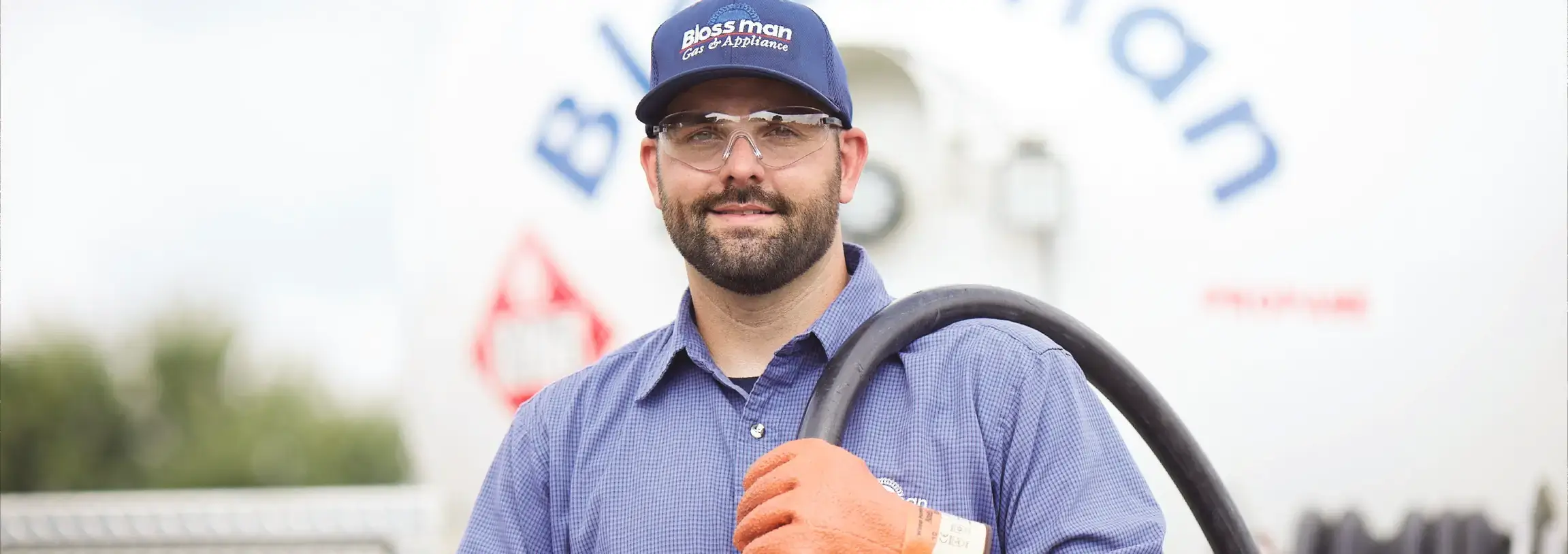Propane is a naturally safe energy source and provides many benefits that ensure worry-free comfort. It has an enviable safety record and history due to the strict regulations and stringent codes developed by the propane industry in association with the National Fire Protection Association (NFPA). Every aspect of installation, storage and tank filling has been evaluated to ensure the highest standards of safety and worry-free operation. Blossman Gas technicians are leaders in the industry on safety, and are highly trained to install and test propane gas appliances.
How can I prepare for a flood or hurricane evacuation?
- If possible, secure the propane tank
- Turn the main gas shutoff valve to the off position (righty, tighty)
- Fasten the protective dome on the tank
- Turn off appliance pilot lights, control valves and manual shutoff valves
- Be sure the tank’s fuel supply level is above 30 percent
- After the flood or hurricane has passed, look for any signs of structural damage.
Call your Blossman service technician if:
- You smell propane gas
- The propane tank has shifted or moved
- The tank regulator was exposed to water
- The gas lines have pulled away from the tank or appliance or if the lines are damaged, bent or broken
- Propane appliances or controls were exposed to water
Should you and your family evacuate, shut off your propane tank by turning the gas supply valve in a clockwise direction. Once the evacuation is complete, call your local propane provider to get your gas reestablished safely.
Here are a few tips to ensure a safe environment when using propane:
- Use scratch-n-sniff samples from Blossman Gas to become familiar with the chemical odorant of propane, which smells a lot like rotten eggs
- Do not tamper with gas supply lines
- Never attempt a “do-it-yourself” repair on any gas appliance
- Know where any underground or above ground gas service lines are located, especially when doing yard work
- Do not tamper with any safety devices, regulators or storage tank fittings
- Know where your main gas shutoff valve is located
5 Tips for Grilling Safety
- Always keep the top open when lighting a grill until you are sure that it is lit
- Never pour an accelerant such as lighter fluid or gasoline on the grill
- Never use matches or lighters to check for leaks
- When finished grilling, turn off the burner controls and close the cylinder valve
- Make sure the grill is clean. When finished grilling and the grill is turned off but hot, clean off the grates. Once the grill cools, clean out the collection tray.
The proper sequence for starting your gas grill:
- Open the grill lid; never light a gas grill with the lid closed.
- Turn on the gas supply.
- Turn the ignition burner to high.
- Light the ignition.
- Turn on the second, third or fourth burner if needed.
- Adjust burners to desired temperature.
By following this sequence, excess gas will not accumulate inside the grill when lighting.
Gas Safety Check
If you are unsure whether your propane gas system is working properly, one of our trained technicians will perform a Gas Safety Check. This important safety and preventative maintenance inspection takes 30 to 90 minutes and your system will be tested for leaks and checked to ensure it meets all applicable safety standards. It involves your entire propane gas system, including the tank, pipes, regulators, gauges, connectors, valves, vents, thermostats, pilots, burners and appliance controls. When completed, you can be assured that your system is safe and in good working condition.
What do I do if I smell gas?
If you think you smell propane in your home, RV or the area around any gas equipment; or if a gas alarm signals the presence of propane, you should do the following
- Extinguish all smoking materials and turn off any open flames
- Vacate the building or vehicle immediately
- Do not use any electrical switches, appliances, thermostats or telephones in the affected area
- Turn your main gas shutoff valve to the off position (righty, tighty)
- Call Blossman and/or your local fire department from a cell phone or neighbor’s phone
- Do no re-enter the building until advised to do so
An odorant is purposely put into the tank to help easily detect leaks or broken pipes. Safety is our #1 priority.
Even if you do not continue to smell propane, do not turn on the supply valve until a qualified Blossman service technician or emergency personnel tests for escaped propane. NEVER test for propane using an open flame. Only suitable leak detection devices should be used. Your Blossman service technician will check all of your appliances and re-light any gas pilots when the leak situation has been fixed.
What do I do if there is a pilot outage?
- Call Blossman’s customer care team
- Turn off gas at the tank
- Wait for company employee to arrive
What do I do if I suspect a carbon monoxide leak?
- Turn off the appliance
- Get everyone to fresh air immediately
- Open windows and doors to air out the room or building
- Call 911 or call your local fire department to check for CO contamination
